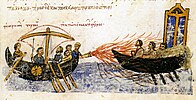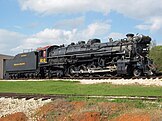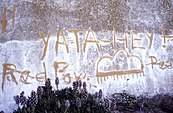Wikipedia:Main Page/Tomorrow
From tomorrow's featured article
The first Arab siege of Constantinople in 674–678 was a major conflict of the Arab–Byzantine wars, and the first culmination of the Umayyad Caliphate's expansionist strategy towards the Byzantine Empire. In 672–673 Arab fleets secured bases along the coasts of Asia Minor, and set up a loose blockade around Constantinople. They used the peninsula of Cyzicus near the city as a base to spend the winter, and returned every spring to launch attacks against the city's fortifications. Finally the Byzantines managed to destroy the Arab navy using a new invention, the liquid incendiary substance known as Greek fire (pictured). The Byzantines also defeated the Arab land army in Asia Minor, forcing them to lift the siege. A peace treaty was signed, and following the outbreak of another Muslim civil war, the Byzantines experienced a brief period of ascendancy. The siege was the first major Arab defeat in 50 years of expansion. Tales of a large-scale siege of Constantinople even reached China. (Full article...)
Did you know ...
- ... that Texas and Pacific 610 was once bought for $1?
- ... that Helmut Bauer confirmed around 150,000 young people, including 500 in Tanzania?
- ... that although the plant species Dolichostachys elongata was first described in 1962, it was not considered validly published until 60 years later?
- ... that a review described He Fucked the Girl Out of Me as being about "all the ways in which American society fails its most vulnerable"?
- ... that the restoration of Neknampur Lake was recognised "as the best model of lake restoration in India"?
- ... that Benjamin Franklin Shumard's assistant named an oak species after him, and then sabotaged his reinstatement after he was fired?
- ... that the 2013 book Brick by Brick, about how The Lego Group reinvented itself, became a popular business text?
- ... that the Trilobite Wilderness is so rich in trilobite fossils that in places virtually every rock contains a fossil?
- ... that cavalry officer Harvey Tuckett retired from the British Army to become an actor, but was shot in a duel by his former commanding officer?
In the news (For today)
- Samantha Harvey (pictured) wins the Booker Prize for her novel Orbital.
- Archbishop of Canterbury Justin Welby announces his resignation as a result of the John Smyth abuse scandal in the Church of England.
- In Zhuhai, China, 35 people are killed in a vehicle-ramming attack.
- Alliance for Change, led by Navin Ramgoolam, wins the Mauritian general election.
On the next day
November 20: Transgender Day of Remembrance
- 284 – Diocletian became Roman emperor, eventually establishing reforms that ended the Crisis of the Third Century.
- 1739 – War of Jenkins' Ear: A British naval force arrived at the settlement of Portobello in the Spanish Main, capturing it the next day.
- 1969 – A group of Native American activists began a 19-month occupation (graffiti pictured) of Alcatraz Island in San Francisco Bay.
- 1979 – Armed insurgents attacked and took over the Masjid al-Haram in Mecca, declaring that one of their leaders was the Mahdi, the prophesied redeemer of Islam.
- 1994 – In accordance with the Lusaka Protocol, the Angolan government signed a ceasefire with UNITA rebels in a failed attempt to end the Angolan Civil War.
- Carl Axel Arrhenius (d. 1824)
- Benoit Mandelbrot (b. 1924)
- Meredith Whitney (b. 1969)
- Ancel Keys (d. 2004)
Tomorrow's featured picture

|
Machado de Assis (1839–1908) was a Brazilian novelist, poet, playwright and short story writer, widely regarded as the greatest writer of Brazilian literature. In 1897, he founded and became the first president of the Brazilian Academy of Letters. He was multilingual, having taught himself French, English, German and Greek later in life. Machado's work shaped the realist movement in Brazil and the birth of the Brazilian republic made Machado become more critical and an observer of the Brazilian society of his time. Generally considered to be Machado's greatest works are Dom Casmurro (1899), Memórias Póstumas de Brás Cubas (Posthumous Memoirs of Brás Cubas, also translated as Epitaph of a Small Winner) and Quincas Borba (also known in English as Philosopher or Dog?). In 1893, he published "A Missa do Galo" ("Midnight Mass"), often considered to be the greatest short story in Brazilian literature. This photograph of Machado was taken by the Brazilian photographer Marc Ferrez in 1890. Photograph credit: Marc Ferrez; restored by Adam Cuerden
Recently featured:
|
Other areas of Wikipedia
- Community portal – The central hub for editors, with resources, links, tasks, and announcements.
- Village pump – Forum for discussions about Wikipedia itself, including policies and technical issues.
- Site news – Sources of news about Wikipedia and the broader Wikimedia movement.
- Teahouse – Ask basic questions about using or editing Wikipedia.
- Help desk – Ask questions about using or editing Wikipedia.
- Reference desk – Ask research questions about encyclopedic topics.
- Content portals – A unique way to navigate the encyclopedia.
Wikipedia's sister projects
Wikipedia is written by volunteer editors and hosted by the Wikimedia Foundation, a non-profit organization that also hosts a range of other volunteer projects:
-
Commons
Free media repository -
MediaWiki
Wiki software development -
Meta-Wiki
Wikimedia project coordination -
Wikibooks
Free textbooks and manuals -
Wikidata
Free knowledge base -
Wikinews
Free-content news -
Wikiquote
Collection of quotations -
Wikisource
Free-content library -
Wikispecies
Directory of species -
Wikiversity
Free learning tools -
Wikivoyage
Free travel guide -
Wiktionary
Dictionary and thesaurus
Wikipedia languages
This Wikipedia is written in English. Many other Wikipedias are available; some of the largest are listed below.
-
1,000,000+ articles
-
250,000+ articles
-
50,000+ articles



